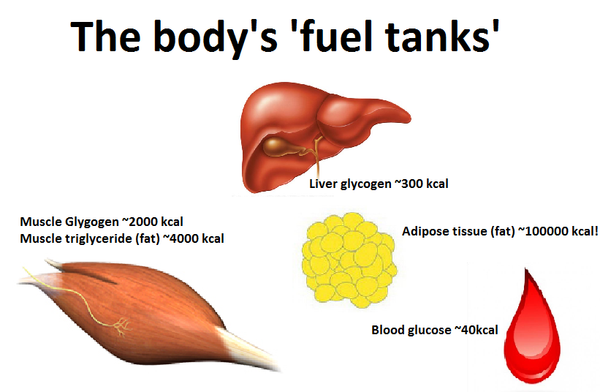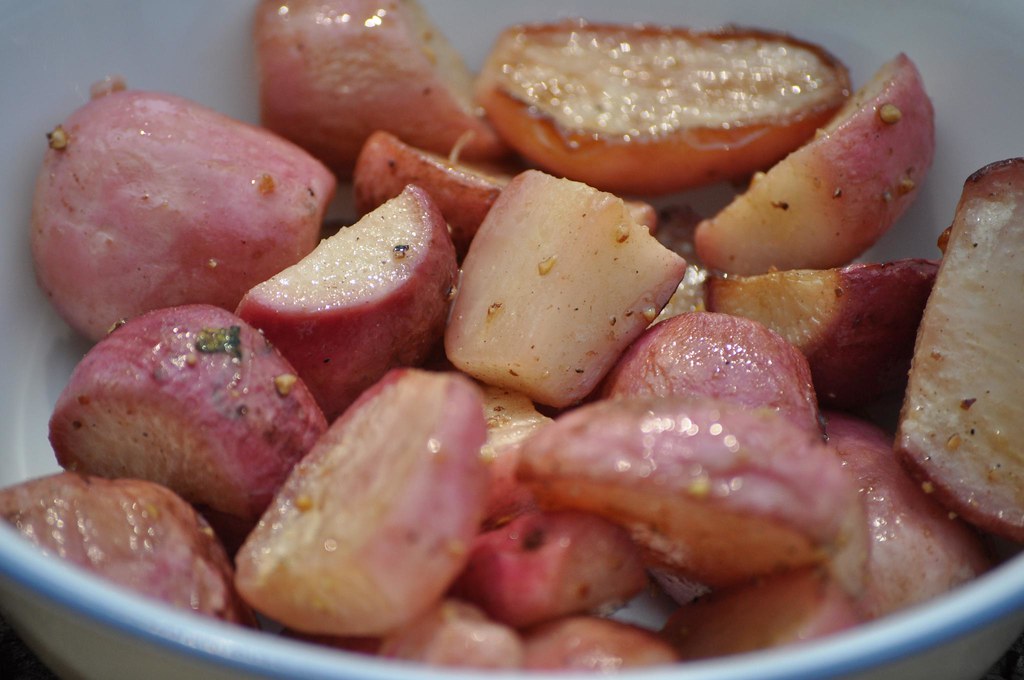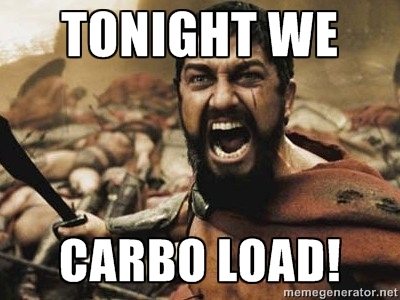Outside of being downright delicious, carbohydrates do serve an important role in day-to-day nutrition, and especially so with competitive athletes.
Today’s guest post comes courtesy of strength coach, Travis Hansen. If you happened to miss the first two installments of this article series, please check them out HERE and HERE.
Right now, I’m going to jump right into things and discuss five more final reasons why any team sport or explosive based athlete requires carbohydrates in order to optimize their performance and physique
#1-CENTRAL FATIGUE MANAGEMENT
This theory continues to be explored, and isn’t fully understood yet. When we train long and hard, levels of free Tryptophan (5-HT) begin to circulate in higher quantities throughout our bloodstream. Eventually Tryptophan crosses the blood-brain barrier where it’s converted into Serotonin.
Serotonin has been shown to elicit key symptoms of fatigue when there is still available peripheral energy sources available to our working muscles. Dr. Mark Davis published a very interesting article in a Sports Nutrition Journal back in the late 90’s which covered nearly every element of “The Central Fatigue Theory.” (1)
If you are a geek like me and want to know all of the ins and outs of this particular subject matter, then I would definitely give it a good look. I’m going to bypass some of the specifics and just give you what’s really important here.
The F-TRP/BCAA ratio becomes very significant. In order to gain access into the brain, Tryptophan needs a specific transporter that BCAA’s (Branched Chain Amino Acids) compete with. Thus, by increasing BCAA’s in the blood, one could simply assume that this would limit Tryptophan levels and subsequent fatigue. Unfortunately, BCAA’s don’t show much promise in this arena directly, and there are a number of factors that Davis discusses which help explain the dilemma that is beyond the scope of this article.
On the upside, carbohydrate feedings show a consistently strong impact on CNS fatigue suppression.
According to Davis, one way in which they do this is by limiting the release of FFA or free fatty acids into the bloodstream. When we train at high intensities, liver glycogen support for the muscles in our body can be reduced fairly quickly. As training continues, we begin to rely upon more fat for fuel.
Fats influence F-TRP and its binding with a protein called Albumin. In other words, if FFA’s are elevated due to a lack of carbs then they will naturally knock of Tryptophan from Albumin which will then allow the now unbound Trytophan to make its way to the brain and subsequently induce fatigue.
I should also note that the exact mechanism for why carbohydrates prevent fatigue is very controversial still, and one theory is that glucose is the preferential source of fuel for neural cells and they absolutely crave this particular energy source when it’s readily available.
#2-CORTISOL LEVELS
When it comes to maximizing your physique and overall athletic performance there is zero doubt that Cortisol is your body’s potential kryptonite!
Several pathways throughout the human body are to be disrupted when Cortisol is high and chronically elevated by consuming less carbohydrates combined with rigorous training protocols.
Thyroid conversion will be altered as well as nervous system activity. Direct protein synthesis is reduced, and last but not least, Insulin and Testosterone levels will take a substantial hit. And if you already read the previous two articles (see links in intro) then you can already appreciate just how much of a negative impact this can create.
#3-DE NOVO LIPOGENESIS
I’ve been excited to discuss this issue because I still get asked the question whether or not we really store carbs as fat very easily.
The answer is definitely no.
De Novo Lipogenesis is the production of fat from carbohydrates specifically. Again this all goes back to The First Law of Thermodynamics, or calories in vs. calories out. You can’t store more energy if you are taking in less energy.
Period.
I know I might be beyond beating a dead horse here, but some people still can’t accept this scientific law and blame everything else for weight gain or lack of success in losing fat/weight, especially carbs.
Come on.
According to the highly credible and world renown physiologist Lyle McDonald, De Novo Lipogenesis is quite difficult to come by to say the least. Under normal dietary conditions, where people aren’t severely obese, upwards of 700-900 grams of carbs per day for several days had to be ingested in order for De Novo to occur. (2) This is an absolutely INSANE amount of carbohydrates mind you.
And some of the reasons why it’s difficult to store carbs as fat is because of the glucose-ffa cycle. This cellular function just means that when we eat carbs we burn carbs, and vice versa. Moreover, there is roughly 500 grams or so of potential glycogen that can be stored in the muscle and liver which amounts to approximately 2000 calories.

Also, standard high intensity weight and athletic training causes these stores to naturally adapt and increase their storage potential even further making fat storage from carbohydrates even harder to come by. So as you can see from the evidence above, if you are a female or male athlete who wants to get leaner and improve your body composition, then by all means eat your carbs!
#4-SLEEP FUNCTION
According to the American Society for Clinical Nutrition, carbohydrates consumed prior to sleep can decrease the onset of actual sleep. (3)
A common sleep deficiency in research is initiation, so the carbs could be very helpful in this department if you are an athlete who needs to quickly recover and perform at a high level regularly.
Moreover, although the primary type of clients in which I work with aren’t bodybuilders or figure competitors, I have been fortunate enough to train quite a few over the years and consult several of them and prescribe and monitor their nutrition. A very consistent observation has been definitive improved sleep quality with adequate carbohydrate consumption with other influential factors held constant.
This observation is highly subjective, but if several of these athletes are benefiting from more carbs, then that is more than good enough for me as a coach who wants them to be at their best.
#5-LEPTIN PRODUCTION
I’m going to very quickly introduce or simply review this hormone and give you a very basic short course on the hormone.
Leptin is a peptide hormone that is primarily synthesized and released from our fat cells in the body. Leptin has specific receptors in the brain which help to regulate energy production, appetite, and weight management to name a few.
Basically, if calories, bodyfat levels, or carbs are too low then Leptin production is decreased and energy expenditure decreases, performance decreases, hunger goes through the roof, and we pack on lbs. Keep Leptin at normal levels by eating sufficient carbs and calories at a healthy weight/bodyfat level and the metabolism remains in harmony. Here are a few starter articles to get you properly acquainted with Leptin if you aren’t already:
Control Leptin and Control Your Leanness
Bodyweight Regulation: Leptin Part I
SCIENTIFIC REFERENCES:
#1-Davis, M. Carbohydrates, branched-chain amino acids, and endurance: The Central Fatigue Hypothesis. International Journal of Sports Nutrition, 5: 29-38, 1995.
#2-http://www.bodyrecomposition.com/fat-loss/how-we-get-fat.html/
#3-http://ajcn.nutrition.org/content/85/2/426.full
About the Author
Travis Hansen has been involved in the field of Human Performance Enhancement for nearly a decade. He graduated with a Bachelor’s degree in Fitness and Wellness, and holds 3 different training certifications from the ISSA, NASM, and NCSF. He was the Head Strength and Conditioning Coach for the Reno Bighorns of the NBADL for their 2010 season, and he is currently the Director of The Reno Speed School inside the South Reno Athletic Club. He has worked with hundreds of athletes from almost all sports, ranging from the youth to professional ranks. He is the author of the hot selling “Speed Encyclopedia,” and he is also the leading authority on speed development for the International Sports Sciences Association.




 provide any study on this one.
provide any study on this one. In the first article, you saw the influence systemic hydration levels have on performance outcomes, and the high amounts of H2O that is to be stored in our glycogen stores. Any small decrease in hydration (2-3%) has been shown to lead to poorer performance and you absolutely risk this by depleting glycogen stores in your muscles and liver by consuming less carbs.
In the first article, you saw the influence systemic hydration levels have on performance outcomes, and the high amounts of H2O that is to be stored in our glycogen stores. Any small decrease in hydration (2-3%) has been shown to lead to poorer performance and you absolutely risk this by depleting glycogen stores in your muscles and liver by consuming less carbs.


